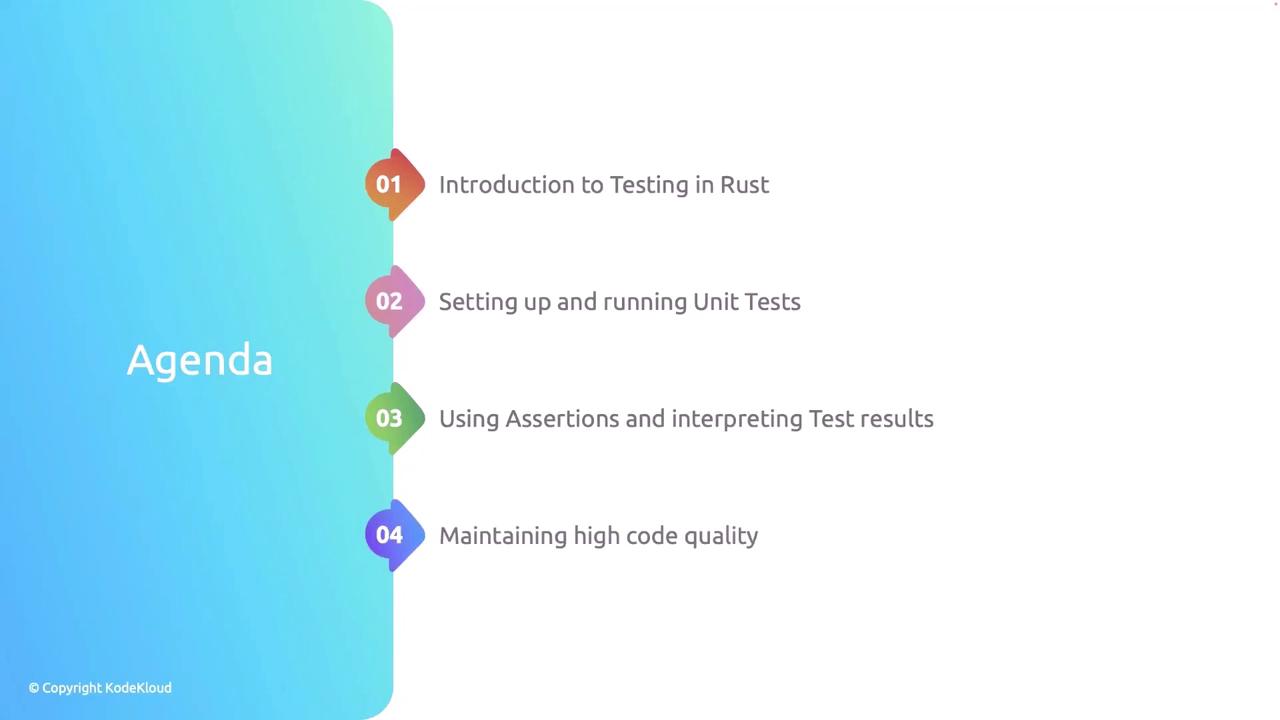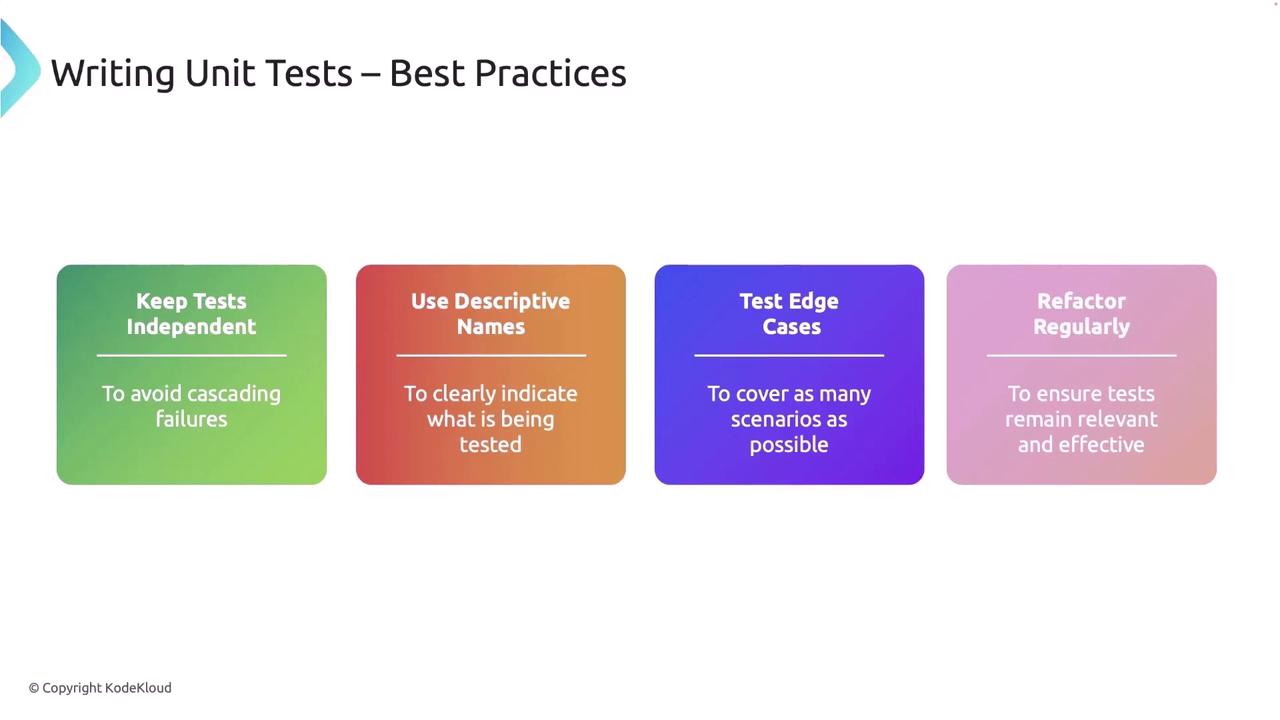Rust Programming
Testing Continuous Integration
Introduction to Testing in Rust
Welcome to our comprehensive guide on testing in Rust. Testing is an essential part of software development that verifies your code behaves as expected and helps prevent bugs from reaching production. Rust, renowned for its safety and performance, offers powerful built-in tools for writing effective tests.
![]()
In this guide, we will cover the basics of testing in Rust. By the end, you will know how to set up and run unit tests, utilize various assertions to confirm code behavior, and maintain a high level of code quality.
To begin, let's prepare our environment for testing.

Creating a Rust Library Project with Tests
When you create a new Rust library project using Cargo, a sample test module is automatically included in your main library file. Consider the following example:
pub fn add(left: u64, right: u64) -> u64 {
left + right
}
#[cfg(test)]
mod tests {
use super::*;
#[test]
fn it_works() {
let result: u64 = add(2, 2);
assert_eq!(result, 4);
}
}
Here, the #[cfg(test)] attribute instructs the Rust compiler to compile the test module only during testing. The block mod tests contains the test functions, and use super::*; imports items from the parent module, making them accessible within the tests.
Writing and Running Simple Tests
Let’s explore a simple example by writing a function called multiply, which multiplies two numbers, and then creating a unit test to verify its functionality.
pub fn multiply(a: i32, b: i32) -> i32 {
a * b
}
#[cfg(test)]
mod tests {
use super::*;
#[test]
fn test_multiply() {
let result: i32 = multiply(3, 4);
assert_eq!(result, 12);
}
}
In this example:
- The test module is conditionally compiled only during testing.
- The
#[test]attribute designates the functiontest_multiplyas a test case. - The
assert_eq!macro verifies that the result ofmultiplymatches our expected output.
When you run cargo test, Cargo compiles all functions marked with #[test] and executes them, providing a summary of passing or failing tests.

Example of a Failing Test
To understand how test failures are reported, modify the expected value in the test_multiply function, as shown below:
#[cfg(test)]
mod tests {
use super::*;
#[test]
fn test_multiply() {
let result: i32 = multiply(3, 4);
assert_eq!(result, 15);
}
}
When you run the tests, Cargo will display an error because the expected value (15) does not match the actual result (12). The command-line output will be similar to:
calculator on 🏺 master [?] is 📦 v0.1.0 via 🦀 v1.82.0
➜ cargo test --quiet
running 1 test
test result: ok. 1 passed; 0 failed; 0 ignored; 0 measured; 0 filtered out; finished in 0.00s
running 0 tests
test result: ok. 0 passed; 0 failed; 0 ignored; 0 measured; 0 filtered out; finished in 0.00s
calculator on 🏺 master [?] is 📦 v0.1.0 via 🦀 v1.82.0
And here is the detailed error message:
#[cfg(test)]
mod tests {
use super::*;
#[test]
fn test_multiply() {
let result: i32 = multiply(3, 4);
assert_eq!(result, 15);
}
}
right: 15
note: run with `RUST_BACKTRACE=1` environment variable to display a backtrace
failures:
tests::test_multiply
test result: FAILED. 0 passed; 1 failed; 0 ignored; 0 measured; 0 filtered out; finished in 0.00s
error: test failed, to rerun pass `--lib`
calculator on ✗ master [?] is v0.1.0 via 🔧 v1.82.0
This output shows the expected vs. actual outcome, enabling you to quickly pinpoint the issue.
Understanding Test Assertions
Rust provides a variety of assertion macros to verify code behavior during testing:
assert!: Confirms that a condition is true.assert_eq!: Checks that two expressions are equal.assert_ne!: Ensures that two expressions are not equal.- Custom assertions: Allow you to supply a custom error message to be displayed if the assertion fails.
Consider this example demonstrating several assertions:
#[cfg(test)]
mod tests {
use super::*;
#[test]
fn test_assertions() {
// Assert that two values are equal
assert_eq!(multiply(2, 3), 6);
// Assert that two values are not equal
assert_ne!(multiply(2, 3), 7);
// Assert with a custom message
assert!(multiply(2, 2) == 5, "Multiplication failed!");
}
}
When this test runs, the third assertion will fail, and the custom message "Multiplication failed!" will be displayed along with additional error details:
thread 'tests::test_assertions' panicked at 'src/lib.rs:21:9: Multiplication failed!',
note: run with `RUST_BACKTRACE=1` environment variable to display a backtrace
failures:
tests::test_assertions
test result: FAILED. 0 passed; 1 failed; 0 ignored; 0 measured; 0 filtered out; finished in 0.00s
error: test failed, to rerun pass `--lib`
Tip
Use assertions wisely to ensure clarity in understanding test failures. Custom error messages can be particularly helpful when debugging complex issues.
Testing for Panics with #[should_panic]
Occasionally, you want to ensure that your code correctly handles erroneous situations by panicking. Rust offers the #[should_panic] attribute for tests that expect a panic. In the following example, the divide function panics if division by zero is attempted:
pub fn divide(a: i32, b: i32) -> i32 {
if b == 0 {
panic!("Division by zero!");
}
a / b
}
#[cfg(test)]
mod tests {
use super::*;
#[test]
#[should_panic(expected = "Division by zero!")]
fn test_divide_by_zero() {
divide(10, 0);
}
}
The expected parameter defines the panic message you anticipate. Running cargo test confirms that the test passes when the expected panic occurs.
The test output is similar to:
➜ cargo test --quiet
running 1 test
.
test result: ok. 1 passed; 0 failed; 0 ignored; 0 measured; 0 filtered out; finished in 0.00s
Using Result<T, E> in Tests
Rust test functions can return a Result<T, E>, which allows the use of the ? operator for smoother error handling. The following example checks if the file "Cargo.toml" exists:
use std::fs;
#[cfg(test)]
mod tests {
use super::*;
use std::fs;
#[test]
fn test_file_exists() -> Result<(), String> {
let file_path = "Cargo.toml";
if fs::metadata(file_path).is_ok() {
Ok(())
} else {
Err(format!("File {} does not exist.", file_path))
}
}
}
This test returns Ok(()) if "Cargo.toml" is found, and an error message if not. Running cargo test confirms if the file is present.
➜ cargo test --quiet
running 1 test
test result: ok. 1 passed; 0 failed; 0 ignored; 0 measured; 0 filtered out; finished in 0.00s
Best Practices for Writing Unit Tests
Adhering to best practices in testing leads to more reliable and maintainable code. Here are some guidelines for writing unit tests in Rust:
- Keep tests independent: Avoid interdependencies between tests to prevent cascading failures.
- Use descriptive names: Clear test names help identify the functionality being verified.
- Cover edge cases: Test both common scenarios and edge cases, including potential error conditions.
- Refactor tests as needed: Update your tests to match code changes and improvements.

Best Practice
A robust test suite not only validates your current code but also safeguards against future regressions.
Following these best practices will help you catch bugs early and maintain a healthy codebase.
What's Next?
In the next article, we will delve deeper into mocking and integration testing. You will learn how to test more complex scenarios and manage external interactions effectively.
For more detailed information on Rust testing techniques, you might find these resources helpful:
Happy testing!
Watch Video
Watch video content